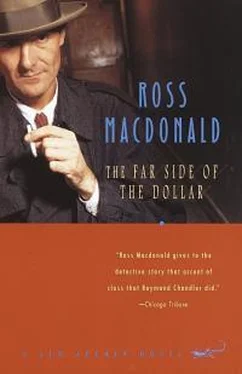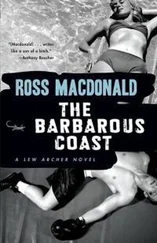We had a bad passage, and Susanna stopped going to parties, at least the ones I went to. I heard she had a marriage which didn’t take. Then she had a career, which took.
“How did she happen to know Carol?” I said to Joey.
“You’ll have to ask her yourself. She told me at the time, but I don’t remember. My memory isn’t what it was.”
The present was depressing him. He poured himself a drink.
I refused the offer of one. “What happened to Carol?”
“She dropped out of sight. I think she ran off with a sailor, or something like that. She didn’t have what it takes, anyway, after the first bloom.”
Joey sighed deeply. “If you see Susanna, mention my name, will you, Lew? I mean, if you can do it gracefully.”
He moved one hand in an undulating horizontal curve. “She acts like she thought I was dead.”
I used Joey’s phone to make a call to Susanna Drew’s office. Her secretary let me talk to her: “This is Lew Archer, Susanna.”
“How nice to hear from you.”
“The occasion isn’t so nice,” I said bluntly. “I’m investigating a murder. The victim may or may not be a girl you knew back in the forties, named Carol.”
“Not Carol Harley?”
“I’m afraid she’s the one.”
Her voice roughened. “And you say she’s dead?”
“Yes. She was murdered yesterday in a place called Ocean View.”
She was silent for a moment. When she spoke again, her voice was softer and younger. “What can I do?”
“Tell me about your friend Carol.”
“Not on the telephone, please. The telephone dehumanizes everything.”
“A personal meeting would suit me much better,” I said rather formally. “I have some pictures to show you, to make the identification positive. It should be soon. We’re twenty-four hours behind–”
“Come over now. I’ll send your name out front.”
I thanked Joey and drove to Television City. A guard from the front office escorted me through the building to Susanna Drew’s office. It was large and bright, with flowers on the desk and explosive-looking abstract expressionist paintings on the walls. Susanna was standing at the window, crying. She was a slim woman with short straight hair so black the eye stayed on it. She kept her back to me for some time after her secretary went out and closed the door. Finally she turned to face me, still dabbing at her wet cheeks with a piece of yellow Kleenex.
She was fortyish now, and not exactly pretty, but neither did she look like anybody else. Her black eyes, even in sorrow, were furiously alive. She had style, and intelligence in the lines and contours of her face. Legs still good. Mouth still good.
She said: “I don’t know why I’m carrying on like this. I haven’t seen or heard from Carol in seventeen or eighteen years.” She paused. “I really do know, though. It is Margaret I mourn for. Do you know Hopkins’s poem?”
“You know I don’t. Who’s Margaret?”
“The girl in the poem,” she said. “She’s grieving over the fallen autumn leaves. And Hopkins tells her she’s grieving for herself. Which is what I’m doing.” She breathed deeply. “I used to be so young.”
“You’re not exactly over the hill now.”
“Don’t flatter me. I’m old old old. I was twenty in 1945 when I knew Carol. Back in the pre-atomic era.”
On the way to her desk she paused in front of one of the abstract paintings, as if it represented what had happened to the world since. She sat down with an air of great efficiency. “Well, let me look at your pictures.”
“You won’t like them. She was beaten to death.”
“God. Who would do that?”
“Her husband is the prime suspect.”
“Harley? Is she– was she still with that schmo?”
“Evidently she still was.”
“I knew he’d do her in sooner or later.”
I leaned on the end of her desk. “How did you know that?”
“It was one of those fated things. Elective affinities with a reverse twist. She was a really nice child, as tender as a soft-boiled egg, and he was a psychopathic personality. He just couldn’t leave her alone.”
“How do you know he was a psychopathic personality?”
“I know a psychopathic personality when I see one,” she said, lifting her chin. “I was married to one, briefly, back in the fabulous fifties. Which constitutes me an authority. If you want a definition, a psychopathic personality is a man you can’t depend on for anything except trouble.”
“And that’s the way Harley was?”
“Oh yes.”
“What was his first name?”
“Mike. He was a sailor, a sailor in the Navy.”
“And what was the name of his ship?”
She opened her mouth to tell me, I believe. But something shifted rapidly and heavily in her mind, and closed off communication. “I’m afraid I don’t remember.”
She looked up at me with black opaque eyes.
“What did he do before he went into the Navy? Was he a photographer?”
She looked back over the years. “I think he had been a boxer, a professional boxer, not a very successful one. He may have been a photographer, too. He was the sort of person who had been a number of things, none of them successfully.”
“Are you sure his name wasn’t Harold?”
“Everybody called him Mike. It may have been a nom de guerre .”
“A what?”
“A fighting name. You know.”
She breathed deeply. “You were going to show me some pictures, Lew.”
“They can wait. You could help me most right now by telling me what you can remember about Carol and Harley and how you got to know them.”
Tensely, she looked at her watch. “I’m due in a story conference in one minute.”
“This is a more important story conference.”
She breathed in and out. “I suppose it is. Well, I’ll make it short and simple. It’s a simple story, anyway, so simple I couldn’t use it in my series. Carol was a country girl from Idaho. She ran away from home with an AWOL sailor. Mike Harley came from the same hick town, I think, but he’d already been in the Navy for a couple of years and seen the world. He promised to take her out to the coast and get her into the movies. She was about sixteen and so naive it made you want to weep or burst out laughing.”
“I can hear you laughing. When and where did you happen to meet her?”
“In the early spring of 1945.1 was working at Warner’s in Burbank and spending weekends in various places. You know the old Barcelona Hotel near Santa Monica? Carol and Harley were staying there, and it’s where I– well, I got interested in her.”
“Were they married?”
“Carol and Harley? I think they’d gone through some sort of ceremony in Tia Juana. At least Carol thought they were married. She was also thought Harley was on extended leave, until the Shore Patrol picked him up. They whisked him back to his ship and Carol was left with nothing to live on, literally nothing. Harley hadn’t bothered to make an allotment or anything. So I took her under my wing.”
“And brought her to see Joe Sylvester.”
“Why not? She was pretty enough, and she wasn’t a stupid girl. Joey got her a couple of jobs, and I spent a lot of time with her on grooming and diction and posture. I’d just been through an unhappy love affair, in my blue period, and I was glad to have somebody to occupy my mind with. I let Carol share my apartment, and I actually think I could have made something out of her. A really wholesome Marilyn, perhaps.”
She caught herself going into Hollywood patter, and stopped abruptly. “But it all went blah.”
“What happened?”
“Harley had left her pregnant, and it began to show. Instead of grooming a starlet, I found myself nursing a pregnant teenager with a bad case of homesickness. But she refused to go home. She said her father would kill her.”
Читать дальше












